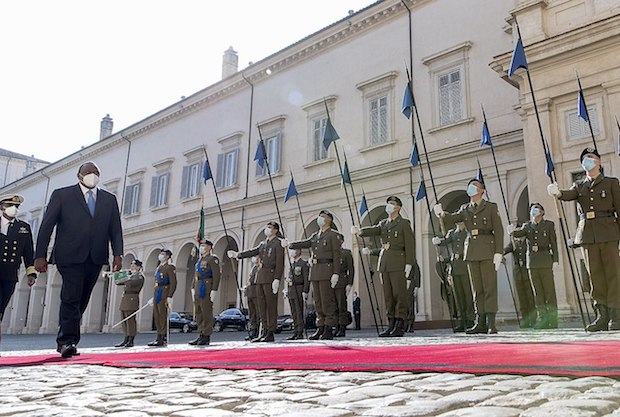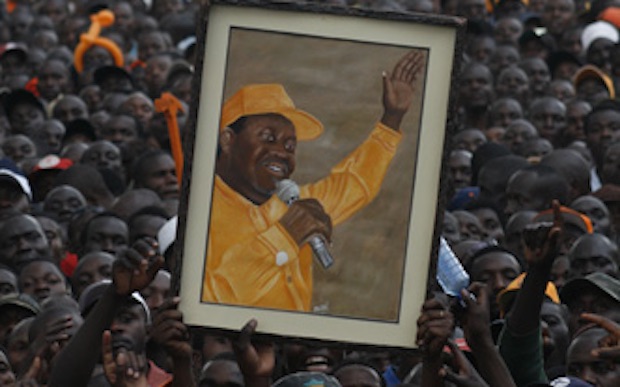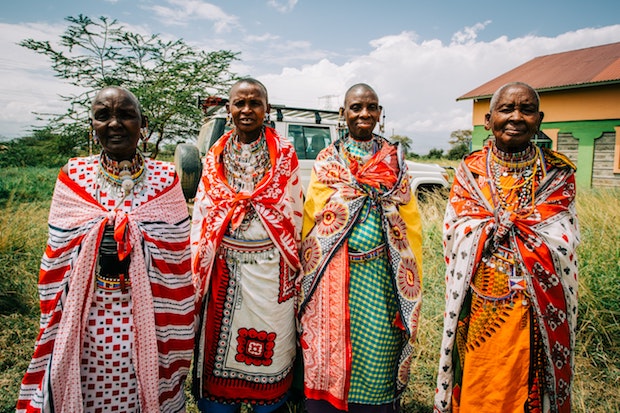With presidential elections due in August, almost all denominations, except the Methodists, have banned the use of their places of worship for campaigning.
![A sunset in Nairobi. About 85% of the Kenyan population identifies as Christians. / Photo: [link]Joseph Ndungu[/link], Unsplash, CC0](https://cms.evangelicalfocus.com/upload/imagenes/6254537917d8b_JosephNdugu.jpg) A sunset in Nairobi. About 85% of the Kenyan population identifies as Christians. / Photo: [link]Joseph Ndungu[/link], Unsplash, CC0
A sunset in Nairobi. About 85% of the Kenyan population identifies as Christians. / Photo: [link]Joseph Ndungu[/link], Unsplash, CC0
Kenya still remembers the violent riots that left dozens dead after the last presidential elections in 2017.
At that time, the president and leader of the country's former single party, the Kenya African National Union (KANU), Uhuru Kenyatta, won the elections with 54% of the vote.
Violence had already been present after the 2007 polls, where at least 1,200 people were killed and 600,000 displaced. But the Supreme Court found irregularities and ordered a rerun of the elections 60 days later.
The main opposition leader, former Prime Minister Raila Odinga, called for a boycott of the rerun election, which ended with Kenyatta winning with a 98% of the vote. The clashes between supporters of the two leaders did not subside until 2018, when they appeared to shake hands and proclaimed a truce.
A particularly polarised atmosphere is expected for the 9 August presidential election, in part because of the large coalition formed by Kenyatta and Odinga's parties, the Jubilee Party and the Orange Democratic Movement, with Odinga running for the presidency after Kenyatta has already reached the constitutional limit of two terms (which he previously unsuccessfully tried to extend).
However, the rejection by the vast majority of religious denominations and Christian denominations of the use of their places of worship for electoral campaigning could help to lower the tone.
Kenyatta and Odinga's parties are running under a coalition called Azimio la Umoja (Search for Unity), and their main rival will be another large coalition, Kenya Kwanza, led by the current deputy Prime Minister, William Ruto, who has the support of former Vice-President Musalia Mudavadi, among others.
While Kenyatta and Odinga come from families with a strong political tradition in the country, being the sons of Kenya's first President and Deputy President respectively, Ruto never tires of repeating how modest his background is, although his critics accuse him of corruption.
“These elections are going to be extremely competitive”, the Secretary General of the Evangelical Alliance of Kenya, Nelson Makanda, tells Spanish news website Protestante Digital.
“In 2007, we already had a very competitive election like this that ended up with post-election violence and around 1,200 people dead. The church, above all, is necessary to intervene and to be a mediator in such situations”, points out Makanda.

Amid this situation, the Evangelical Alliance of Kenya has been one of the Christian groups that has circulated an internal document among its church members in recent months stating that “politicians should not be allowed to exploit and abuse their privilege as leaders by violating the day and place of worship through politicking in church”.
For Makanda, this warning is justified by the “long history of church influence in politics and government" in Kenya.
“The church in Kenya has influenced politics quite a bit from the pre-colonial time to colonial times and nowadays. It has had a habit of being the civic voice, the voice that represents citizens, specially in the eighties. It has said what is right and has tried to reduce the excesses of government and the structural wrongdoing”, he explains.
According to Makanda, “the church has occupied a very significant space. Because of that, politicians realize that for them being there leads to gain influence and they want to get there. But once they get there, they weaken the voice of the church”.
“Since we are in a multiparty season, opponents of a political leader whom you allow to speak in church begin to see you as partisan and begin to weaken your voice”, he adds.
Furthermore, “because of Covid-19 restrictions, rallies have been restricted, so that politicians find the church as the only organized space where there are crowds for them to come and speak. So they want to come in and speak”.
Makanda warns that “politicians are selfish. They focus on their own self-interest. They compete for seats and for positions, and sometimes they are not very civilised in their language. When they come, they take this space, which is holy, which is a place of worship, but people come to worship God, not to listen to political rhetoric. You cannot find a congregation with members who have a single political identity, they are as diverse as the parties in Kenya”.
“We have realised that if we don't stop that habit, two things could happen. First, the gospel message is going to be interfered with. And secondly, it will become political competition for the rest of the church. We realise that if you open up the space of the church to politics, there will be no time left for the word of God because there are five, six, seven candidates who want to address some congregation within a two-hour period, and that is the time for worship".
The Secretary General calls to avoid political sectarianism, because “making a candidate our candidate does not make sense, since there are many members in the churches who may have a different opinion”.
In addition to the evangelical entity, Anglicans, Presbyterians and Roman Catholics in the country have also issued statements banning their communities from giving any space to political campaigning, with the sole exception of the Methodists.
Speaking to Religion News Service, the bishop and head of the Methodist Church in Kenya, Joseph Ntombura, justified this position stating that “human beings are political, so there is nothing wrong with inviting the politicians in church. Some of the politicians are our pastors”.

According to Makanda, the Evangelical Alliance of Kenya represents around 748 denominations and has a membership of about 50,000 churches across the country and “in general, most of them have seen the statement in a very positive and affirmative way".
“They have affirmed this position. It seems they were waiting for guidance and direction. I would say 99% of them have sent feedback saying that they support this decision. They have taken it as a position of the church, so they are not allowing politicians to speak in their spaces", he underlines.
The leader of the Alliance also admits that “there are still some others who find it hard not to allow politicians to speak out. One church said to me: 'All the mainstream churches that have been here for over 100 years, the Anglican Church and some others, have already benefited from political patronage. And now are you trying to stop us from benefiting?`”.
“Politicians make contributions for the building of a church, or a grant, or sometimes rent land. This is why they are feeling that we are preventing them from benefiting from political patronage as well, because they are prone to try to entice voters, sometimes through gifts. Then there are a few others who don't know what to do because they are not used to dealing with power", Makanda explains.
Nelson Makanda believes that “church members are happy. They say they rather have politicians hold rallies outside the church because it keeps the sanctity of the place of worship and builds a positive culture that affirms the place of worship as a sacred place and a place for the word of God. And it also allows worship ministers the ability to speak out boldly when they need to rebuke".
“Even people of other faiths, such as Muslims, have affirmed this and say it is the right position, the right direction to take", he adds.
Apart from partisan polarisation and the manipulation of worship spaces for campaigning, Kenya's elections have other challenges, such as registering millions of voters on the electoral roll and digitising the system in a country where vast areas of territory do not yet have access to a 3G network.
In early October 2021, the Electoral Commission of Kenya launched a massive campaign to register six million new voters, but the process has not gone very well. “Most of them are young people", says Makanda. For some analysts, the lack of success in the campaign suggests that Kenyan youth are losing faith in the national political scenario.
“We see this as a challenge because it would be nice if those young people who have turned 18 and want to vote were allowed to do so. It is a challenge that some young people cannot vote because of lack of registration or lack of a national identity card, because the government has this law and they think that this test is not safe", points out the head of the Evangelical Alliance.
In part, according to Makanda, the failure is due to “underfunding of the electoral body. About 15% to 20% of the country has no 3G network, and that is why the 2017 elections were annulled [and had to be repeated]. That has not been corrected," he adds.
Makanda also points to limited “resources for civic education. Some of our citizens are illiterate voters, so that if you don't prepare them, you get a lot of invalid votes on polling day because they don't know what to do when they go to the polling station. Resources are very limited to prepare the material to be able to train civic educators".
That is why the Evangelical Alliance is in contact with other bodies “to train our members and the citizens who are going to vote, about their rights, but also about the imperative of peace and the imperative of citizens' rights and the freedom to choose a leader they want, so that it is not something that can be compromised and they can exercise the freedom to choose their leaders".

Another problem is that “the risk of violence is very high". Makanda stresses that, as evangelicals, they want to “pastor a peaceful election. We are sending some of our leaders, depending on where the political leaders go to church”.
“We are asking them to start 'bothering' the candidates from now on. To pray with them. To call them to see how the campaign is going and what prayer requests they have. That way, if there is conflict and we have to mitigate it, we already have a pastoral relationship and engagement with the political leaders, and mediation becomes easier", he states.
In August Kenya will hold its first post-pandemic elections. The effect of Covid-19 on churches has resulted in the temporary closure of some places of worship, but also in the relocation of some congregations in more modest facilities due to declining membership.
In 2020 Kenya experienced a drop in annual GDP growth of up to 5.3 percentage points, although the following year it stabilised at a positive 5%, according to the World Bank.
Despite this, “resources have become a challenge because many people have lost jobs. And when they lose their jobs it affects the church. Donations were reduced because people didn't meet. Many of the worshippers have lost their jobs, so that income is low," explains Makanda, adding that 40% of national health care is provided by the country's churches.
In Kenya, more than 5,600 people have died from Covid-19, and only 14% of the population is vaccinated, according to the 'Our world in data' platform.
“Pastors and ministers of worship have died, church members have died, and the pandemic has hit hard. Moreover, deaths from diseases other than Covid-19 have been real here", says Makanda, who adds that facing this reality without the possibility for all churches to hold their meetings online, due to lack of digital resources, “has affected the spirituality" of some believers.
“On the positive side, many churches have created small groups, so small group ministry has grown in many places where it wasn't before", he adds.
Furthermore, “the role of the family in discipleship has improved because of Covid-19. Fathers, mothers or even older siblings have taken responsibility, and many households have grown in faith. People have found intimacy with the Christian faith within the home, and we believe that is positive".
Due to the pandemic, the Kenyan Alliance has also seen the importance for “the church to critically reflect on native missions. As the pandemic brought restrictions, many people who have helped to support the outreach to the indigenous communities, who are in need of receiving the gospel, have come from outside".
“We must ask ourselves how we strengthen indigenous missions so that we don't have communities that have not been evangelised because we didn't have missionaries coming from all continents because of the Covid-19 restrictions. The role of indigenous missionaries is something we are thinking about as the Evangelical Alliance", concludes the General Secretary.
[analysis]
[title] A Christian-majority country in a region threatened by jihadism [/title]
[text]Around 85% of the population in Kenya identify as Christian. About 33% claim to be Protestant, while 20.6% say they are Roman Catholic. Muslims are 11% of the national demographic.
A particular case in a region where jihadism has gained presence in recent years, especially in Somalia, but with other neighbouring countries such as Ethiopia, Eritrea and Sudan still on the World Watch List, which Kenya left this year.
Throughout 2021, several organisations that monitor the situation of Christians in the different continents of the world warned of a wave of attacks against the Christian population in Kenya.
In January this year, International Christian Concern reported the death of thirteen people on a bus in an alleged attack by the radical Somali Islamist group Al-Shabaab.
In early February, four more people were killed after the vehicle in which they were travelling was attacked, also allegedly by militants of the same terrorist group.[/text]
[/analysis]
[donate]

Las opiniones vertidas por nuestros colaboradores se realizan a nivel personal, pudiendo coincidir o no con la postura de la dirección de Protestante Digital.
Si quieres comentar o